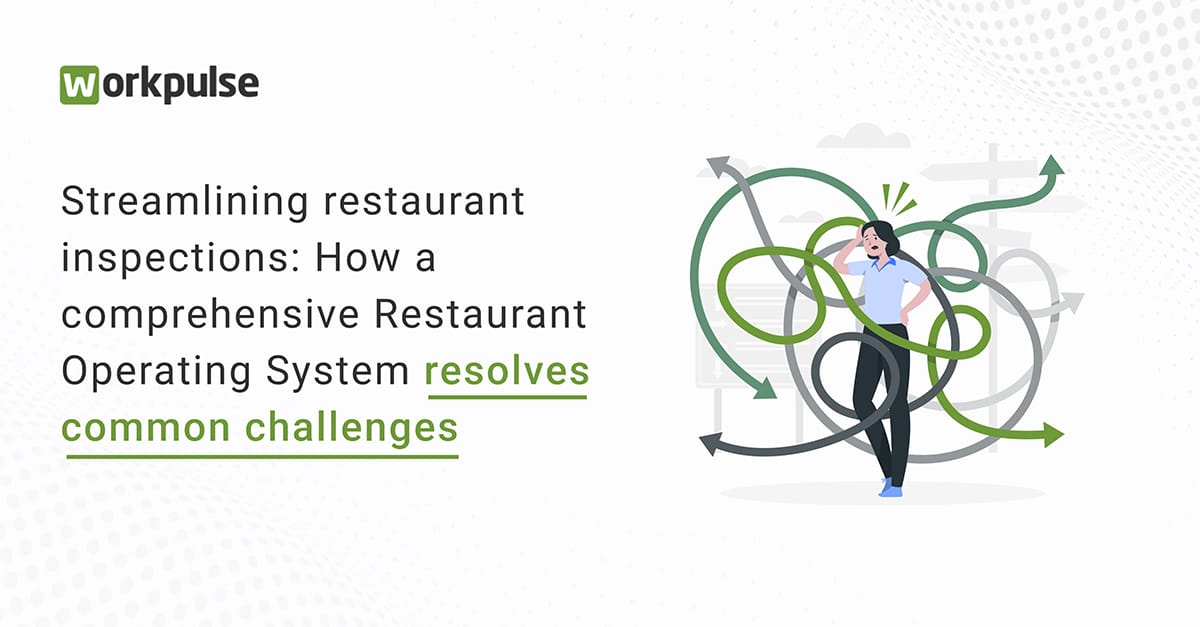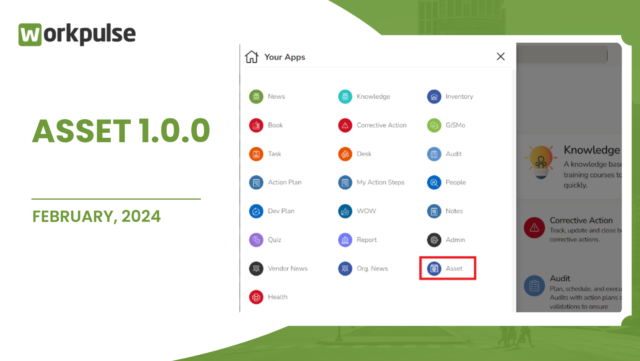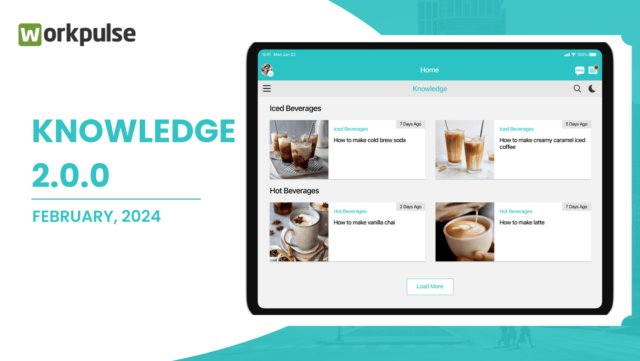Restaurant inspections play a crucial role in ensuring compliance with regulations, maintaining brand standards, and upholding food safety. However, the inspection process can be a daunting task for restaurant operators, with various challenges that arise along the way. All of that can be solved by a robust and agile restaurant operating system.
In this blog post, we’ll explore the common issues faced by restaurants during inspections and demonstrate how a robust Restaurant Operating System (ROS) comprising Brand Standards and Food Safety Compliance, Restaurant Audit Management, Guest Recovery & Retention, and Facilities and Equipment Maintenance can help overcome these challenges effectively.
Why are inspections important in a quick-service restaurant?
When it comes to inspections, restaurant owners always have a hard time preparing for them. However, before we dive into why common inspection challenges are faced by quick service restaurants, let’’ understand why they’re important in a restaurant facility.
- Food Safety: QSRs handle and serve large volumes of food quickly. Inspections ensure that the food handling, preparation, and storage practices meet the highest standards of cleanliness and food safety. Regular inspections help identify potential hazards and prevent foodborne illnesses, ensuring that customers are served safe and wholesome meals.
- Compliance with Regulations: QSRs must comply with local, state, and federal regulations governing food safety, health, sanitation, and hygiene. Inspections verify that the restaurant is adhering to these regulations, including proper documentation, training of staff, and maintenance of required licences and permits. Non-compliance can lead to penalties, fines, and even closure of the establishment.
- Maintaining Brand Standards: QSRs often operate under specific brand guidelines to ensure consistency across their locations. Inspections help enforce these brand standards, ensuring that each restaurant maintains a consistent level of quality, cleanliness, and service. This is essential for building customer trust, loyalty, and brand reputation.
- Operational Efficiency: Inspections provide an opportunity to assess the efficiency of restaurant operations. Inspectors evaluate factors such as workflow, equipment maintenance, cleanliness, and organization. Identifying operational gaps during inspections enables QSRs to make necessary improvements, streamline processes, and enhance overall efficiency, leading to smoother operations and improved customer experiences.
- Guest Satisfaction: Inspections indirectly contribute to guest satisfaction. By ensuring compliance with food safety and hygiene standards, inspections enhance the overall dining experience. Customers feel more confident in dining at a restaurant that has passed inspections, knowing that their health and safety are prioritised. Meeting and exceeding guest expectations through consistent inspections can help build positive word-of-mouth, repeat business, and a loyal customer base.
Challenges faced by restaurant owners during inspections?
Restaurants often face various challenges during inspections, be it local, state or federal. Here are some common inspection challenges encountered by restaurant owners and managers:
- Compliance with Regulations: Staying compliant with the ever-changing regulations and health codes can be overwhelming. Restaurants must ensure they meet the specific requirements set by local, state, and federal authorities. Adhering to these regulations regarding food safety, sanitation, labelling, allergen control, and employee certifications can be complex and time-consuming.
- Staff Training and Knowledge: Maintaining a well-trained and knowledgeable staff is essential for meeting inspection standards. Restaurants need to invest in continuous training to ensure that employees are up to date with proper food handling, hygiene practices, allergen awareness, and safety protocols. Inconsistent training or lack of employee awareness can lead to compliance issues during inspections.
- Documentation and Record-Keeping: Inspections often require comprehensive documentation, including food safety plans, temperature logs, cleaning schedules, employee training records, and maintenance logs. Managing and organizing these documents can be challenging, and any missing or inaccurate records can result in compliance violations.
- Time Constraints: Inspections are typically conducted during busy restaurant hours, putting additional pressure on staff and operations. Restaurant teams must balance serving customers, meeting inspection requirements, and addressing any issues identified by the inspector within a limited timeframe. This time constraint can be stressful and may impact the overall flow of operations.
- Consistency Across Multiple Locations: Restaurants with multiple locations face the challenge of maintaining consistency in operations and standards across all establishments. Ensuring that each location follows the same procedures, adheres to brand standards, and meets compliance requirements can be a daunting task. Inconsistencies between locations can lead to compliance gaps and pose reputational risks.
- Communication and Follow-Up: Communication between restaurant staff and inspectors is critical during inspections. Clear and effective communication regarding procedures, findings, and required corrective actions is essential. Additionally, following up on identified issues and ensuring timely resolution is crucial to maintain compliance and avoid penalties.
Addressing these inspection challenges requires proactive measures such as implementing a comprehensive Restaurant Operating System (ROS) that streamlines processes, automate documentation, provides training resources, and facilitates efficient communication and task management.
By leveraging technology and adopting best practices, restaurants can mitigate inspection challenges, ensure compliance, and maintain high standards of food safety, hygiene, and operational excellence.
How Workpulse restaurant operating system assists with restaurant inspections
Are you feeling the heat in the kitchen? Does the sight of the red book make you break out in a cold sweat? Are you feeling like your restaurant’s documentation is a bit more half-baked than a muffin fresh out of the oven? Is your lukewarm red book the culprit behind your regular inspection failures and the reason why the upcoming assessments give you nightmares? And to top it off, are your guests serving up some tough love, telling you your restaurant is not quite up to what you advertise or think it is?
If you experience any one or more of these situations regularly, you’re not alone. The reason for poor results is that doing things the same old way gets you the same old results. Failing to score A+ in inspections, losing customers, and not knowing the truth of your restaurant operations are grounds enough to replace that dreaded red book of yours with a superior digital solution.
And we have just the right one for you, the Workpulse Restaurant Operating System (rOS).
Along with the four modules of Brand Standards and Food Safety Compliance, Restaurant Audit Management, Guest Recovery & Retention, and Facilities and Equipment Maintenance, Workpulse rOS help you ace every inspection, every time. Here are some of the features of the Workpulse restaurant operating system that help you excel at inspections.
#1: Compliance management
Workpulse rOS provides a comprehensive solution for managing compliance with food safety regulations, health codes, and brand standards. It offers customizable inspection checklists that can be tailored to specific requirements. Restaurants can easily track and monitor compliance in real-time, ensuring that all necessary measures are in place to meet inspection standards. Workpulse rOS automates compliance management, making it easier for restaurants to stay up to date with changing regulations and minimize compliance risks during inspections.
#2: Task and action management
Workpulse rOS simplifies the process of creating, assigning, and tracking tasks related to inspections. Managers can assign specific tasks to staff members, set due dates, and monitor task progress. This ensures that required actions, such as equipment maintenance, cleaning tasks, or staff training, are promptly addressed. By streamlining task management, Workpulse rOS helps restaurants improve their overall inspection readiness and maintain compliance.
#3: Documentation and recordkeeping
Efficient documentation and record-keeping are crucial for inspections. Workpulse rOS provides a centralized platform for storing and accessing important documents required for inspections, such as food safety plans, training records, temperature logs, maintenance records, and more. This eliminates the need for manual paperwork and reduces the risk of misplaced or incomplete records. Having all documentation readily available within the system streamlines the inspection process and allows inspectors to quickly access the necessary information.
#4: Real-Time reporting and analytics
Workpulse ROS offers real-time reporting and analytics capabilities that provide valuable insights into compliance trends, performance metrics, and areas for improvement. Restaurants can generate comprehensive reports on compliance status, inspection results, and task completion rates. These insights help identify potential compliance issues, track progress over time, and make data-driven decisions to enhance inspection readiness. By leveraging real-time reporting and analytics, restaurants can proactively address compliance gaps and continuously improve their operations.
#5: Communication and collaboration
Effective communication and collaboration are essential during inspections. Workpulse rOS facilitates seamless communication between managers, staff members, and inspectors. The system includes messaging features that enable real-time communication, ensuring that everyone stays informed and can address any issues or queries raised during inspections promptly. Smooth communication and collaboration within Workpulse rOS enhance efficiency, prevent miscommunication, and facilitate a smoother inspection process.
#6: Training and education
Workpulse rOS offers training and education resources to help restaurants educate their staff on food safety practices, compliance requirements, and inspection protocols. The system provides access to training materials, quizzes, and certifications that can be completed within the platform. By offering training resources, Workpulse rOS ensures that employees are well-prepared and knowledgeable about the necessary protocols and procedures. This promotes a culture of compliance and enhances the overall inspection readiness of the restaurant.
#7: Upload visual evidence for compliance
With Workpulse rOS, restaurant operators can now easily upload photos as proof of compliance in audit forms, providing a visual and concrete representation of adherence to brand standards and food safety regulations. This feature enhances the accuracy and reliability of audit documentation while streamlining the overall auditing process.
By enabling the ability to upload photos directly into audit forms, Workpulse rOS eliminates the need for manual record-keeping and reduces the risk of misplaced or incomplete information. Restaurant staff can conveniently capture and attach photos using a mobile device, ensuring that evidence of compliance is readily available for review during audits.
#8: View audit information on desktops, tablets, & mobile devices
With Workpulse rOS (restaurant operating system), accessing audit information has never been easier. Whether you’re using a mobile device, tablet, or desktop, Workpulse rOS allows you to conveniently access and manage all your audit-related data.
Gone are the days of cumbersome paperwork and manual record-keeping. Workpulse rOS digitizes the entire audit process, enabling you to access audit information from anywhere, at any time. With just a few clicks or taps, you can retrieve crucial audit data, review reports, and analyze trends. Workpulse rOS empowers you to make informed decisions based on real-time audit data. You can track compliance status, identify areas of improvement, and take proactive measures to address any issues. The system provides comprehensive reports and analytics, enabling you to gain insights into audit performance, trends, and compliance metrics.
#9: Receive notifications about audits
With Workpulse rOS, restaurants can ensure they never miss an important audit by receiving timely notifications on pending or expiring audits. This feature helps restaurant managers stay organized and on top of their audit schedule.
Workpulse rOS provides a centralized platform where audits can be scheduled, assigned, and tracked. When an audit is approaching its due date or is about to expire, the system sends notifications to the relevant personnel, such as managers or auditors. These notifications serve as reminders, prompting them to take action and complete the necessary tasks.
#10: Role-based access
Workpulse rOS offers a flexible and customizable role-based access control system that allows restaurants to define access levels for different user roles. Each role is associated with a set of permissions that determine what actions and data a user can access within the system. By assigning appropriate roles to employees, restaurants can ensure that each staff member has access to the functionalities and information necessary to perform their job duties effectively.
Schedule your Workpulse restaurant operating system demo today
By leveraging the capabilities of Workpulse rOS, restaurants can streamline their inspection processes, improve compliance management, maintain comprehensive documentation, foster effective communication, and continuously enhance their inspection readiness. Workpulse rOS empowers restaurants to proactively address compliance challenges, reduce risks, and maintain high standards of food safety and operational excellence, ultimately leading to successful inspections and satisfied customers. Schedule your demo, and we’ll walk you through the process.




